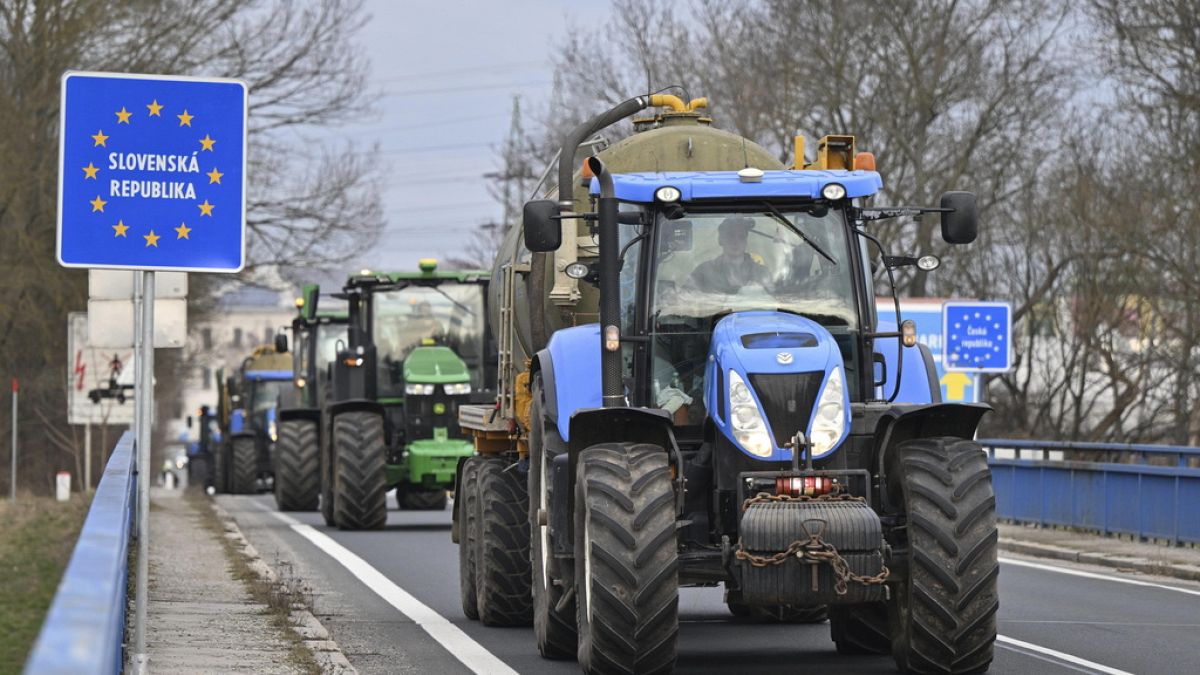 By Euronews, APPublished on 23/02/2024 -
By Euronews, APPublished on 23/02/2024 - Farmers complain that the EU’s environmental policies, such as the Green Deal, and low-cost imports from third countries which they say don't have to respect such high environmental standards.
Farmers from 10 EU countries, ranging from Central Europe to the Baltics and the Balkans, were on Thursday participating in a protest against the bloc's agriculture policies, bureaucracy and overall conditions for their business, organisers say.
Many of the farmers from the Czech Republic, Germany, Poland and Slovakia, met at a number of border crossings.
Farmers complain that the EU’s environmental policies, such as the Green Deal, which calls for limits on the use of chemicals and on greenhouse gas emissions, limit their business and make their products more expensive than non-EU imports.
They also complain about low prices for their products and say grain and other agriculture products coming from Ukraine and Latin America negatively affect the market.
Farmers had invited Czech Agriculture Minister Marek Vyborny, his Slovak counterpart Richard Takac, and the representatives of farmers from Poland and Hungary to rally at a Czech-Slovak border crossing known as Hodonin-Holic, which was blocked by hundreds of tractors.
“We don't protest against the EU, we protest against the wrong decisions by the European Commission,” said Andrej Gajdos from the Slovak Chamber of Agriculture and Food.
Elsewhere, clashes were reported on Thursday between Spanish farmers and police in Zaragoza, the capital of the northeastern Aragon region.
Talks between the government and farmers failed earlier this week with the biggest protest in weeks staged in Madrid on Wednesday.
The government has unveiled a package of 18 measures it said it will present to other EU member states at a meeting of agriculture ministers on February 26.
Carles Peris, Secretary General of the Union of Farmers and Stockbreeders of Valencia, said: "We want a law on the agri-food chain that is able to balance itself, it cannot be that those who generate the value, the producers, are the ones who receive the least money."
Spanish farmers plan to gather in their thousands in the country's capital on Sunday.
In France, some farmers have indicated that they could block the opening on Saturday of the Salon International de L'Agriculture in Paris, which runs until March 3.
Protests were meanwhile held in several cities north of Paris on Thursday with one farmer in the Oise saying: "We feel like we're being taken for a ride, in the sense that the government has promised us a lot of things that we still haven't received."
"This is to show them that we're still here and we're still waiting for answers," he added.
The protests were held despite the government announcing on Wednesday a new bill to strengthen the law on agriculture and food and improve salaries in the sector.
Prime Minister Gabriel Attal also said several million euros would be paid as emergency aid, particularly to livestock farmers.
The new law comes three weeks after the government unveiled a package of measures to stymie the protest movement that included no new pesticide ban "without a solution" and a ban on imports of fruits and vegetables coming from outside the EU that have been treated with Thiaclopride, an insecticide currently banned in the bloc.
The government also said it would propose the creation of a "European control force" to combat fraud, particularly regarding health regulations, and fight against import of food products that go against European and French health standards. It also reaffirmed its opposition to the signing of the EU-Mercosur trade deal.
No comments:
Post a Comment